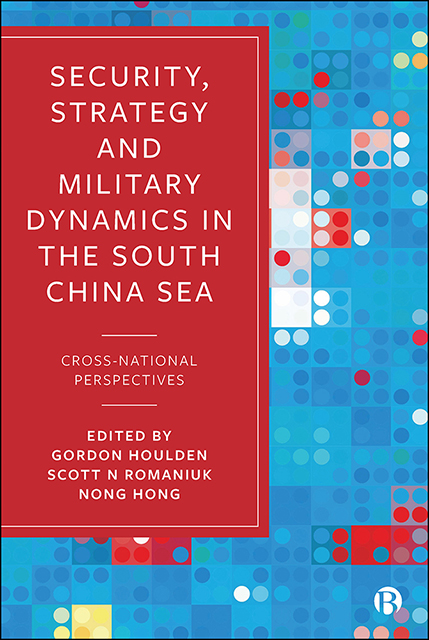Book contents
- Frontmatter
- Contents
- List of Tables
- Notes on Contributors
- Foreword
- Introduction: Strategic Challenges and Escalating Power Rivalry in the South China Sea
- 1 Between Competition and War: Complex Security Overlay and the South China Sea
- 2 The South China Sea as an Echo Chamber of Chinese Foreign and Security Policy
- Part I Claimants of the Contested South China Sea
- Part II Non-Claimants in Southeast Asia
- Part III Quadrilateral Security Dialogue States
- Part IV Non-Claimants in Europe and Eurasia
- Conclusion: Looking over the Horizon – Prospects for Settlement of the South China Sea Dispute?
- Index
6 - The Philippines and the South China Sea Dispute: Duterte’s Hedging Approach with China and the United States
Published online by Cambridge University Press: 13 April 2023
- Frontmatter
- Contents
- List of Tables
- Notes on Contributors
- Foreword
- Introduction: Strategic Challenges and Escalating Power Rivalry in the South China Sea
- 1 Between Competition and War: Complex Security Overlay and the South China Sea
- 2 The South China Sea as an Echo Chamber of Chinese Foreign and Security Policy
- Part I Claimants of the Contested South China Sea
- Part II Non-Claimants in Southeast Asia
- Part III Quadrilateral Security Dialogue States
- Part IV Non-Claimants in Europe and Eurasia
- Conclusion: Looking over the Horizon – Prospects for Settlement of the South China Sea Dispute?
- Index
Summary
Introduction
When President Rodrigo Roa Duterte visited China for the fifth time on August 28 to September 1, 2019, the United States (US) Navy had conducted more Freedom of Navigation Operations (FONOPs) in 2019 than in any year during the same period, to challenge China's position in the South China Sea (SCS). Duterte's fifth visit to China provided him with opportunities to meet President Xi Jinping for the eighth time, amid increasing US– China rivalry in the SCS.
Duterte set a historic record for having the most meetings by a Filipino president with a Chinese counterpart during a mid-term in office, notwithstanding Manila's long-time security alliance with the US. Duterte's visits to China strongly demonstrated his ardent commitment to befriend and comprehensively engage with China on many pragmatic economic and political considerations, with a high expectation that this kind of appeasement could lead to the peaceful management of disputes in the SCS, a vital issue touching the core of Philippine national security interest.
One important outcome of Duterte's 2019 visit to China was the landmark implementation of the November 2018 Memorandum of Understanding (MOU) entered into by the Philippines and China to facilitate their joint cooperation on the development of oil and gas resources in the SCS, particularly in areas being claimed by the Philippines called the West Philippine Sea (WPS), located mainly in the Spratlys. The Philippines and China agreed to move to the next step of joint cooperation by creating steering committees tasked to supervise the process.
With the idea of joint cooperation in the SCS, opposition forces in the Philippines strongly criticized Duterte for being pro-China. Duterte's decision to terminate the US– Philippines Visiting Forces Agreement (VFA) in February 2020 also convinced critics that his administration has become really pro-China. But Philippine Defence Secretary Delfin Lorenzana, who served as Philippine defence attaché to the United States, asserted that Duterte “is pro-Filipino, not pro-China” in his foreign and security policy.
A more nuanced analysis of Duterte's actions in the SCS, however, reveals his apparent pragmatism in dealing with China and the US. Though this pragmatism seemingly displays a pro-China position at the surface, it is arguably not changing the Philippines’ long-standing policy towards China, the US and the SCS dispute.
- Type
- Chapter
- Information
- Security, Strategy, and Military Dynamics in the South China SeaCross-National Perspectives, pp. 117 - 134Publisher: Bristol University PressPrint publication year: 2021



